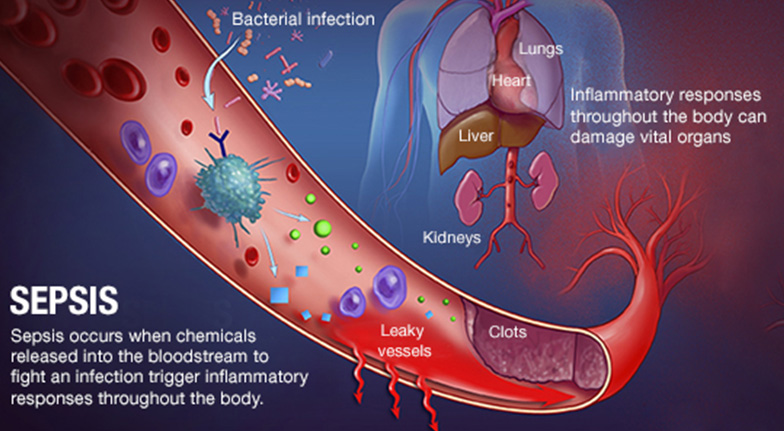Sepsis Rash
Sepsis is the point at which your body has a bizarrely serious reaction to a contamination. It's occasionally called septicemia.
During sepsis, your invulnerable framework, which protects you from microorganisms, delivers a ton of synthetics into your blood. This triggers broad irritation that can prompt organ harm. Clumps decrease blood stream to your appendages and interior organs, so they don't get the supplements and oxygen they need.
In extreme cases, sepsis causes a hazardous drop in pulse. Specialists refer to this as "septic shock." It can rapidly prompt organ disappointment, like your lungs, kidneys, and liver. This can be lethal.
Sepsis Causes and Hazard Elements
Bacterial diseases are most frequently to fault for sepsis. Be that as it may, it can likewise happen due to different diseases. It can start anyplace microbes, parasites, growths, or infections enter your body, even something as little as a hangnail.
A contamination of the bone, called osteomyelitis, could prompt sepsis. In individuals who are hospitalized, microbes might enter through IV lines, careful injuries, urinary catheters, and bed bruises.
Read Also: Chia Seeds
Sepsis is more normal in individuals who:
Have debilitated invulnerable frameworks on account of conditions like HIV or malignant growth or on the grounds that they consume medications, for example, steroids or those that forestall dismissal of relocated organs
Are pregnant
Are extremely youthful
Are old, particularly assuming they have other medical conditions
Were as of late hospitalized or had significant medical procedures
Use catheters or breathing cylinders
Have diabetes
Have a serious ailment like an infected appendix, pneumonia, meningitis, cirrhosis, or a urinary lot disease
Fever and chills
Exceptionally low internal heat level
Peeing not exactly regular
Quick heartbeat
Queasiness and regurgitating
The runs
Exhaustion or shortcoming
Messy or stained skin
Perspiring or sticky skin
Serious agony
Sepsis Determination
Sepsis is a possibly perilous condition that happens when the body's reaction to a disease harms its own tissues. At the point when the disease battling processes turn on the body, they make organs capability ineffectively and strangely.
Sepsis might advance to septic shock. This is an emotional drop in circulatory strain that can prompt extreme organ issues and demise. Your primary care physician will do an actual test and run tests to search for things like:
Microorganisms in your blood or other body liquids
Indications of disease on a X-beam, CT output, or ultrasound
A high or low white platelet count
A low number of platelets in your blood
Low pulse
A lot of corrosive in your blood (acidosis)
An absence of oxygen in your blood
Issues with how your blood coagulations
Lopsided degrees of electrolytes
Kidney or liver issues
Sepsis Treatment
Your PCP will likely keep you in the medical clinic's emergency unit). Your clinical group will attempt to stop the disease, keep your organs working, and deal with your circulatory strain. IV liquids and additional oxygen can assist with this.
Expansive range anti-toxins might battle contaminations brought about by microorganisms from the get-go. When your PCP understands what's causing your sepsis, they can give you medication that objectives that particular microorganism. Frequently, specialists recommend vasopressors (which make your veins thin) to further develop circulatory strain. You could likewise get corticosteroids to battle irritation or insulin to keep control of your glucose.
In the event that your case is extreme, you could require different sorts of treatment, similar to a breathing machine or kidney dialysis. Or on the other hand you might require a medical procedure to deplete or wipe out a disease.
Sepsis Intricacies
As sepsis deteriorates, it leads to additional issues all through your body. These may include:
Kidney disappointment
Dead tissue (gangrene) on fingers and toes, prompting removal
Lung, cerebrum, or heart harm
A higher gamble of diseases over the long haul
Sepsis can be in the middle somewhere in the range of 25% and 40% of cases.
Sepsis Avoidance
Forestalling contamination is the most effective way to forestall sepsis. Make these strides:
Clean up frequently with cleanser and water for no less than 20 seconds each time.
Stay aware of suggested antibodies for things like influenza and chickenpox.
Keep control of any ongoing medical issue.
Assuming that you have a physical issue that is broken your skin, clean it quickly. Keep it spotless and covered as it recuperates, and watch for indications of contamination.
Treat any contaminations. Move clinical consideration immediately in the event that they don't improve or on the other hand assuming they appear as though they're deteriorating.



Comments
Post a Comment